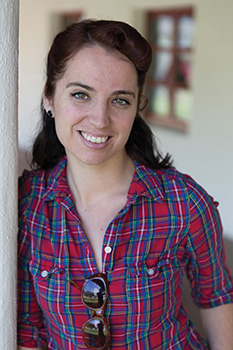A Class Act: CI Student Returns as Faculty
By Marya Jones Barlow

Rachael Jordan
‘08 English
Rachael Jordan loved being a student in CI’s English program so much, she came back to teach.
“My students get so excited when they find out I went here for my undergrad because they get to see a CI success story right in their own classroom,” said the 2008 graduate and lecturer in English Composition. “I was always active on campus as a student, so it’s fulfilling to be in a completely different role now, adding to students' experience of this university.”
Growing up in Long Beach, Jordan discovered her passion for reading and writing at an early age. An insatiable reader who spent Friday afternoons at the library, Jordan was encouraged by her third grade teacher to write her own stories.
At CI, she was inspired by her English professors—as well as jobs as a Resident Assistant, Orientation Leader and Writing Center tutor – to teach undergraduate writing.
“I fell in love with working with first-year college students and I knew right away I wanted to teach at CI,” she said. “I just want to give back the same intimate, amazing experience that I got while being a student here.”
After earning her Master’s in English from CSUN in 2011 and working as a lecturer in its composition program, she returned to CI in 2012 as faculty.
“I remember walking into the first faculty meeting and reminding myself that I could call everyone by their first name,” she said. “Luckily, our English Program faculty are amazing and have made me feel welcome and like a genuine colleague from the very beginning.”
Jordan teaches English 105, English 102 and 103 (Stretch Composition) and English 107 (Advanced Composition)—required writing courses that allow her to work with new students from every major. It’s an important and influential role that she relishes.
“I get to interact with students from across the disciplines, assist them with their transition into college, and teach them the foundations for academic writing and the transferrable writing skills they’ll need for the rest of their college careers,” she said.
She keeps her classes current and captivating by incorporating social media, video and popular culture that students know and use in everyday life. She shows movie clips to practice summary vs. analysis, utilizes movie trailers to teach audience expectation and genre, discusses tweets vs. text messages to help explain genre and communication, and has students practice rhetorical analysis on their favorite song lyrics before asking them to analyze an academic text. In her research, Jordan explores how social networking sites impact students’ literacy and their expressions of gender and sexuality.
“I always try to start with something familiar before we move into the academic,” she said. “And I try to make it clear from the beginning that I want students to come to me with questions and additional feedback. I know how important making personal connections with my professors was for me as a student to help keep me engaged and motivated for my courses and I want to give my students that same opportunity.”
Return to the Table of Contents© Spring 2014 / Volume 18 / Number 1
